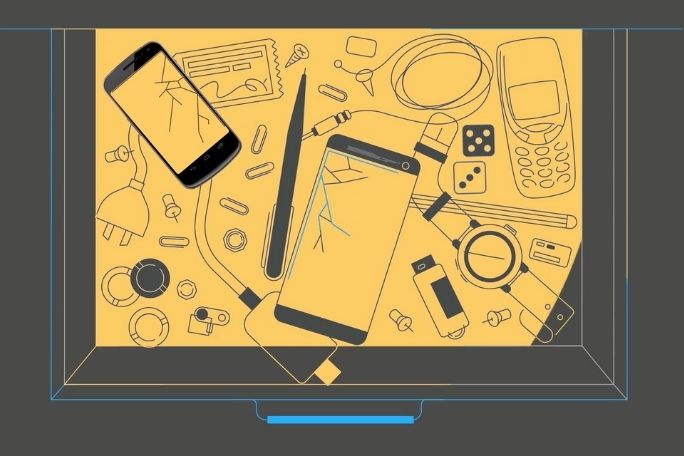Lesson summary
This lesson is part of a unit that explores how electricity and processed materials combine to power mobile phones. In this lesson, students design a sustainable mobile phone of the future. In teams, students develop and pitch their ideas and are scored on various criteria, including their phone’s sustainability.
Learning intentions:
Students will...
- develop creativity and entrepreneurial thinking skills
- understand how to effectively pitch an idea
- demonstrate their understanding of circuitry, precious metals and sustainability through the design of a futuristic phone.
Success criteria:
Students can...
- present a product design to an audience
- work in teams to collaboratively solve problems.
Lesson guides and printables
Lesson details
Curriculum mapping
Australian curriculum content descriptions:
Year 5 & 6 – Design and Technology:
- Examine how people in design and technologies occupations address competing considerations, including sustainability in the design of products, services, and environments for current and future use (ACTDEK019).
- Investigate how electrical energy can control movement, sound or light in a designed product or system (ACTDEK020).
- Investigate characteristics and properties of a range of materials, systems, components, tools and equipment and evaluate the impact of their use (ACTDEK023).
Year 5 – Humanities and Social Sciences:
- The difference between needs and wants and why choices need to be made about how limited resources are used (ACHASSK119).
- Types of resources (natural, human, capital) and the ways societies use them to satisfy the needs and wants of present and future generations (ACHASSK120).
- Influences on consumer choices and methods that can be used to help make informed personal consumer and financial choices (ACHASSK121).
Year 6 – Humanities and Social Sciences:
- How the concept of opportunity cost involves choices about the alternative use of resources and the need to consider trade-offs (ACHASSK149).
- The effect that consumer and financial decisions can have on the individual, the broader community and the environment (ACHASSK150).
- The reasons businesses exist and the different ways they provide goods and services (ACHASSK151).
Year 6 – Science (Chemical and Physical):
- Changes to materials can be reversible or irreversible (ACSSU095)
- Electrical energy can be transferred and transformed in electrical circuits and can be generated from a range of sources (ACSSU097)
Syllabus outcomes: ST3-14BE, ST3-15I, ST3-16P, ST3-6PW, ST3-7PW, ST3-13MW, ST3-6PW, ST3-12MW
General capabilities: Critical and Creative Thinking, Ethical Understanding.
Cross-curriculum priority: Sustainability
Relevant parts of Year 5 & 6 achievement standards:
Year 5 & 6 – Design and Technology:
Students critically examine technologies − materials, systems, components, tools and equipment − that are used regularly in the home and in local, national, regional or global communities, with consideration of society, ethics and social and environmental sustainability factors.
Year 5 – Humanities and Social Sciences:
Students investigate how the characteristics of environments are influenced by humans in different times and places, as they seek resources, settle in new places and manage the spaces within them.
Year 6 – Science:
They learn about transfer and transformations of electricity, and continue to develop an understanding of energy flows through systems.
This lesson is part of the wider unit of work MobileMuster – Hands-on Mobile Phone Recycling – Years 3-6
Time required: 120 mins.
Level of teacher scaffolding: Medium – facilitate class discussion, support groups in developing their ideas.
Resources required
- Student Worksheets – one copy per student
- Device capable of presenting a video to the class
- Pitch Perfect Factsheet – one between four students
Skills
- Collaboration
- Communication
- Enterprise
- Ethical understanding
- Global citizenship
- Leadership
- Problem solving
Additional info
This lesson has been developed as part of Planet Ark’s National Recycling Week. Following this lesson plan is an ideal way for your school to take part in MobileMuster. You’ll be joining thousands of amazing teachers in making a difference and creating positive environmental change. Take part in the Schools Recycling Right Challenge for Planet Ark’s National Recycling Week. Register your lesson or other activities today!


Welcome back!
Don't have an account yet?
Log in with:
By signing up to Cool.org you consent and agree to Cool's privacy policy to
store, manage and process your personal information. To read more, please see
our privacy policy here(Opens in new tab).
Create your free Cool.org account.
Many of our resources are free, with an option to upgrade to Cool+ for premium content.
Already have an account?
Sign up with:
By signing up to Cool.org you consent and agree to Cool's privacy policy to
store, manage and process your personal information. To read more, please see
our privacy policy here(Opens in new tab).